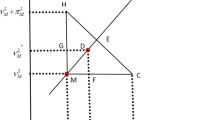Abstract
A novel similarity measure (SM) based upon cosine similarity measure and Frobenius inner product of matrices, and a weighted SM for Pythagorean fuzzy soft sets (PFS-sets/PFSSs) are coined in this article. Some fundamental characteristics of the proposed SM are also brought into light, including that SM of any two PFS-sets equals unity iff the two PFS-sets coincide. Employing this SM, a relation \(\thickapprox ^\lambda \) amongst two PFS-sets is demarcated. Further, it is demonstrated that this relation does not enjoy the status of an equivalence relation. Moreover, the efficacy of the proposed SM is established with the aid of numerical examples. Comparison analysis of the proposed method with some of the prevailing similarity measures is also given, both numerically and diagrammatically. In the end, an application from psychological disorder accompanied by algorithm and flow chart have been put on display through a conjectural case study.



Similar content being viewed by others
References
Atanassov KT (1984) Intuitionistic fuzzy sets. In: Sgurev V (ed), VII ITKRs Session, Sofia, June 1983 (Central Sci. and Techn. Library, Bulg. Academy of Sciences, 1984)
Atanassov KT, Stoeva S (1983) Intuitionistic fuzzy sets. In: Polish Symposium on interval and fuzzy mathematics, Poznan 23-26
Atanassov KT (1986) Intuitionistic fuzzy sets. Fuzzy Sets Syst 20:87–96
Atanassov KT (1999) Intuitionistic fuzzy sets: theory and application. Studies in fuzziness and soft computing, XVIII, Physica Verlag, Heidelberg, pp 324–330
Çağman N, Enginoglu S, Çitak F (2011) Fuzzy soft set theory and its applications. Iran J Fuzzy Syst 8(8):137–147
Chen SM (1995) Measures of similarity between vague sets. Fuzzy Sets Syst 74:217–223
Chen SM (1997) Similarity measures between vague sets and between elements. IEEE Trans Syst Man Cybern B 27(1):153–168
Chen SM, Yeh MS, Hsiao PY (1995) A comparison of similarity measures of fuzzy values. Fuzzy Sets Syst 72:79–89
Guleria A, Bajaj RK (2018) On Pythagorean fuzzy soft matrices, operations and their applications in decision making and medical diagnosis. Soft Comput. https://doi.org/10.1007/s00500-018-3419-z
Hong DH, Kim CA (1999) Note on similarity measure between vague sets and elements. Inf Sci 115:83–96
Hung WL, Yang MS (2007) Similarity measures of intuitionistic fuzzy sets based on \(L_p\) metric. Int J Approx Reason 46:120–136
Hyung LK, Song YS, Lee KM (1994) Similarity measure between fuzzy sets and between elements. Fuzzy Sets Syst 62:291–293
Jun Y (2011) Cosine similarity measures for intuitionistic fuzzy sets and their applications. Math Comput Model 53:91–97
Kharal A (2010) Distance and similarity measures for soft sets. New Math Nat Comput pp 1–14
Kamaci H (2019) Similarity measure for soft matrices and its applications. J Intell Fuzzy Syst 36(4):3061–3072
Li D, Cheng C (2002) New similarity measures on intuitionistic fuzzy sets and application to pattern recognition. Pattern Recognit Lett 23:221–225
Li F, Xu ZY (2001) Similarity measure between vague sets. Chin J Softw 12(6):922–927
Li YH, Olson DL, Zheng Q (2007) Similarity measures between intuitionistic fuzzy (vague) sets: a comparative analysis. Pattern Recognit Lett 28:278–285
Liang Z, Shi P (2003) Similarity measures on intuitionistic fuzzy sets. Pattern Recognit Lett 24:2687–2693
Maji PK, Roy AR, Biswas R (2001) Intuitionistic fuzzy soft sets. J Fuzzy Math 9(3):677–692
Majumdar P, Samanta SK (2008) Similarity measure of soft sets. New Math Nat Comput 4(1):1–12
Molodtsov D (1999) Soft set theory first results. Comput Math Appl 37(4–5):19–31
Muthukumar P, Krishnan SS (2016) A similarity measure of intuitionistic fuzzy soft sets and its application in medical diagnosis. Appl Soft Comput 41:148–156
Naeem K, Riaz M, Peng XD, Afzal D (2019) Pythagorean fuzzy soft MCGDM methods based on TOPSIS, VIKOR and aggregation operators. J Intell Fuzzy Syst 37(5):6937–6957
Naeem K, Riaz M, Afzal D (2019) Pythagorean \(m\)-polar fuzzy sets and TOPSIS method for the selection of advertisement mode. J Intell Fuzzy Syst 37(6):8441–8458
Peng XD, Yang YY, Song J, Jiang Y (2015) Pythagorean fuzzy soft set and its application. Comput Eng 41(7):224–229
Wang J, Gao H, Wei G (2019) The generalized Dice similarity measures for Pythagorean fuzzy multiple attribute group decision making. Int J Intell Syst 34(6):1158–1183
Williams J, Steele N (2002) Difference, distance and similarity as a basis for fuzzy decision support based on prototypical decision classes. Fuzzy Sets Syst 131:35–46
Yager RR (2013) Pythagorean fuzzy subsets, IFSA World Congress and NAFIPS Annual Meeting (IFSA/NAFIPS), 2013 Joint, Edmonton, Canada, IEEE, 57–61
Yager RR, Abbasov AM (2013) Pythagorean membership grades, complex numbers, and decision making. Int J Intell Syst 28(5):436–452
Yager RR (2014) Pythagorean membership grades in multi-criteria decision making. IEEE Trans Fuzzy Syst 22(4):958–965
Zadeh LA (1965) Fuzzy sets. Inf Control 8:338–356
Author information
Authors and Affiliations
Corresponding author
Additional information
Communicated by Leonardo Tomazeli Duarte.
Publisher's Note
Springer Nature remains neutral with regard to jurisdictional claims in published maps and institutional affiliations.
Rights and permissions
About this article
Cite this article
Riaz, M., Naeem, K. & Afzal, D. A similarity measure under Pythagorean fuzzy soft environment with applications. Comp. Appl. Math. 39, 269 (2020). https://doi.org/10.1007/s40314-020-01321-5
Received:
Revised:
Accepted:
Published:
DOI: https://doi.org/10.1007/s40314-020-01321-5




